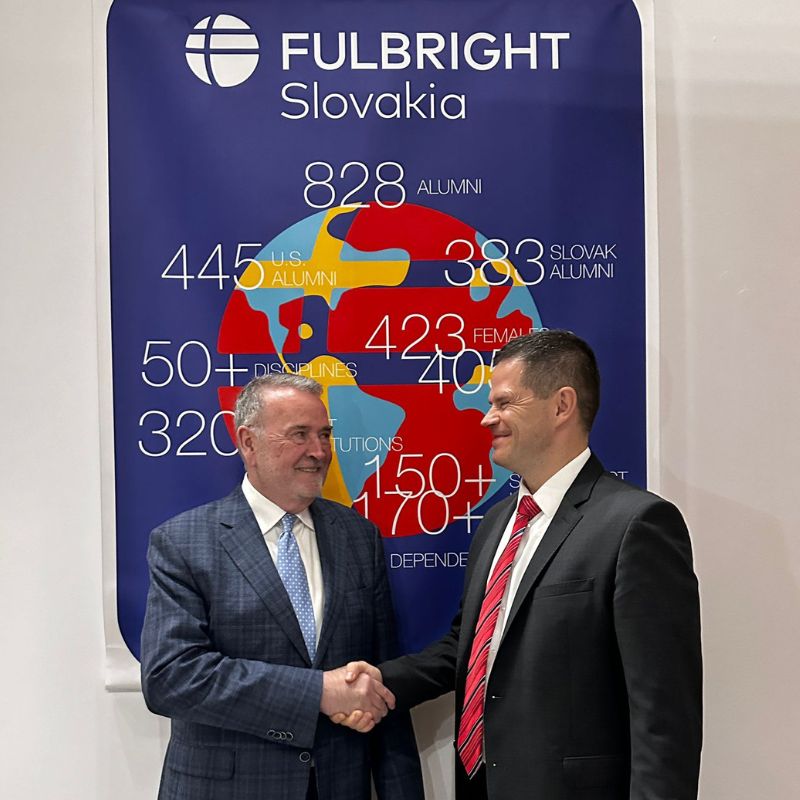Robert Thomas, Professor of the Practice at Georgia Tech’s Scheller College of Business, received a Fulbright Specialist Award to support peace engineering efforts at the Technical University of Košice (TUKE) in Slovakia. His project focused on expanding the university’s capacity to respond to the humanitarian needs arising from the Ukrainian conflict. Thomas worked to develop a scalable model that could be replicated at other regional institutions, fostering cross-sector collaboration among academia, government, business, and NGOs. Reflecting on the experience, he emphasized the importance of collective action to improve lives and promote a more just and sustainable future.
What motivated you to apply for the Fulbright?
I have always admired the Fulbright program given their mission of engaging US citizens with institutions around the world to promote mutual understanding and contribute to a more just, caring and sustainable world. I have been working with the Technical University in Kosice for several years and they raised the possibility of a Fulbright Specialist Award. I expressed interest, and they submitted a proposal to the Slovakia Fulbright Commission for developing a peace engineering approach to the conflict in Ukraine for which I was pleasantly surprised with their selected theme. Given its location near the border, The Technical University of Kosice (TUKE) is geographically well positioned to play a critical role in addressing many of the challenges arising from the conflict in Ukraine.
What specific initiatives did you undertake at the Technical University of Košice to support peace engineering in response to the Ukrainian conflict?
My role at TUKE was to introduce the concept of peace engineering to the faculty and to help develop relationship with other universities, NGOs and business entities that would be valuable in their programs. We built on an existing relationship with the University in Uzhhorod (Ukraine) and linked existing connections with regional cultural and economic organizations that can collaborate with TUKE. We connected TUKE with Habitat for Humanity International, whose European headquarters is in Bratislava and recently committed to a 5-year program in Ukraine. Habitat also collaborates with Georgia Tech’s College of Design and operates in western Ukraine. TUKE is also a member of Ulysseus, an alliance of eight European universities offering programs to students throughout Europe. These and other relationships form a strong foundation for TUKE to expand the scope and scale of their peace engineering activities.
Can you tell us a little bit about what Peace Engineering means to you?
A peace engineering approach to the conflict in Ukraine requires a system-based mindset that incorporates how technology, community engagement and innovative policies can facilitate conditions that foster economic and social recovery. It places emphasis on the long-term consequences of activities and actions that encourage Ukrainian citizens to return to their communities and insure prosperity for future generations.
What was the most rewarding aspect of your time during the project?
My experience with TUKE and Fulbright was very rewarding. I was able to meet many members of the faculty and leadership team and had very interesting and informative conversations. During the 1990s, I worked with the Carpathian Foundation and several universities in the region, which allowed me to reconnect with many old friends and make new acquaintances.
How do you believe the program has enhanced your own teaching or leadership development approach?
I feel that my Fulbright experience has enhanced my teaching, especially with the connection between peace engineering and servant leadership. I discovered a common link between the two – the focus on the growth and development of others, an emphasis on community and a system-thinking approach. The Institute for Leadership and Social Impact (ILSI) defines servant leadership as a commitment to the growth of others and building institutions that contribute to a more just, caring and sustainable society.
Can you share any success stories or positive outcomes from your Fulbright project, and are there any future initiatives or programs that have emerged as a result of your experience?
While I continue to stay in touch with TUKE and provide support and assistance, the success of their program will be based on their leadership and commitment. I am working with Professor Joe Hughes (Drexel University), General Phillip Breedlove (Sam Nunn School), David Bridges (Enterprise Innovation Institute) and others to promote peace engineering in Ukraine. We are speaking at the Globsec Forum in Prague in June on this topic. It is my hope that these efforts will create opportunities for students and faculty from TUKE, Drexel and Georgia Tech. The ultimate goal is to support the people of Ukraine during this conflict and assist them after a lasting peace is obtained as they re-imagine their county.
The Institute for Leadership and Social Impact (ILSI) is an interdisciplinary institute at Georgia Tech dedicated to promoting servant leadership and advancing organizational practices that contribute to a more just, caring, and sustainable world. Through experiential learning, research, and community partnerships, we nurture leaders who drive meaningful social change—locally in Atlanta and globally. To learn more about our initiatives and programs, visit our website.
